By the time you read this post, I will be dead. Or camping. Probably just camping, really, but who can say? I mean, when was the last time you heard from me? I could be dead. There’s a giant fire in California, after all, and we’re skirting it, risking our lives, to bring this investigation of what’s on my Netflix queue to you.
Or in order to go camping, but let’s not quibble.
We frequently tell you to go see films that we love. That’s easy. We’ve seen said films and know that they will make your brains explode with glee. Harder—and perhaps more revealing—is explaining what’s lined up for our own viewing pleasure.
Which old, forgotten gems have caught our attention? Which new releases didn’t motivate me to make it to the theater but did entice me to open the mailbox? What favorites or mistily remembered films are we curious to screen again?
The answers to these questions are now before you. Here are the ten films at the top of my Netflix DVD queue and an explanation of why.
 Onibaba: Often referred to as the creepiest film of all time, this Japanese picture is about a couple of 14th century women who kill soldiers to steal their goods. Atmospheric and dreamy, supposedly this one will scare the pants off me. That’s cool. I’m going to take off my pants anyway. If I didn’t get Onibaba from Netflix and have it staring at me from my coffee table, I’d probably never motivate to see it. God knows the wife won’t watch it with me.
Onibaba: Often referred to as the creepiest film of all time, this Japanese picture is about a couple of 14th century women who kill soldiers to steal their goods. Atmospheric and dreamy, supposedly this one will scare the pants off me. That’s cool. I’m going to take off my pants anyway. If I didn’t get Onibaba from Netflix and have it staring at me from my coffee table, I’d probably never motivate to see it. God knows the wife won’t watch it with me.
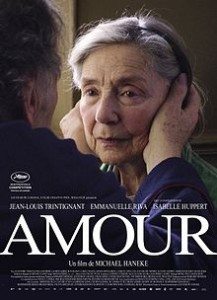 Amour: I’ve never seen a single film Michael Haneke has made. While Amour sounds pretty goddamned depressing, I can take it. Probably. This sounds like one of those films that you never want to watch and then when you do watch it you wonder why it took so long for you to watch it.
Amour: I’ve never seen a single film Michael Haneke has made. While Amour sounds pretty goddamned depressing, I can take it. Probably. This sounds like one of those films that you never want to watch and then when you do watch it you wonder why it took so long for you to watch it.
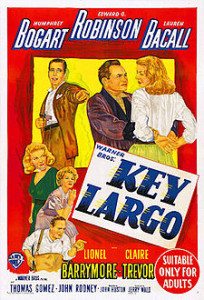 Key Largo: Honestly, this one shouldn’t be on my queue. I’ve seen Key Largo, which is a great Bogart/Bacall noir that takes place during a hurricane in the Florida Keys. I put it on my queue because I was going to write a double feature about this and Cloudy with a Chance of Meatballs, but then I did something else instead. But now that it’s on my queue, damned if I’ll take it off. Bogart! Bacall! Edward G. Robinson! Directed by John Huston! If you decide to watch this, keep an ear out for Claire Trevor’s musical number. Robinson makes her sing for a drink in the film and Huston tricked her into not getting any rehearsal. This is her first raw take and it’s a doozy.
Key Largo: Honestly, this one shouldn’t be on my queue. I’ve seen Key Largo, which is a great Bogart/Bacall noir that takes place during a hurricane in the Florida Keys. I put it on my queue because I was going to write a double feature about this and Cloudy with a Chance of Meatballs, but then I did something else instead. But now that it’s on my queue, damned if I’ll take it off. Bogart! Bacall! Edward G. Robinson! Directed by John Huston! If you decide to watch this, keep an ear out for Claire Trevor’s musical number. Robinson makes her sing for a drink in the film and Huston tricked her into not getting any rehearsal. This is her first raw take and it’s a doozy.
 21 Up: I started watching Michael Apted’s Up series of documentaries a few weeks ago. These films come every seven years, documenting the lives of the same people throughout each installment (with some no shows from year to year). Seven Up! was the first one and it focused on 14 seven-year olds in 1964. 56 Up just came out last year. In 2012, the kids were all 56; get it? The first two were fascinating and I was all psyched to watch them all, but then Netflix took them off instant streaming. I’ve been waiting for 21 Up to arrive for a month.
21 Up: I started watching Michael Apted’s Up series of documentaries a few weeks ago. These films come every seven years, documenting the lives of the same people throughout each installment (with some no shows from year to year). Seven Up! was the first one and it focused on 14 seven-year olds in 1964. 56 Up just came out last year. In 2012, the kids were all 56; get it? The first two were fascinating and I was all psyched to watch them all, but then Netflix took them off instant streaming. I’ve been waiting for 21 Up to arrive for a month.
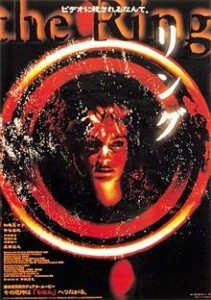 Ringu: The original Japanese film that was remade as The Ring (and rewritten by my friend Ehren Kruger). Is it scary? Is it interesting? People seem to say so. Are they right? I am dubious. I didn’t think much of many of the horror films people were insisting I watch when I was binging on scary films last year. This is a relic of those days and it’s been reliably getting bumped further and further down the queue as I add new stuff. It’s quite possible it will actually arrive soon and then I will watch it. Or not.
Ringu: The original Japanese film that was remade as The Ring (and rewritten by my friend Ehren Kruger). Is it scary? Is it interesting? People seem to say so. Are they right? I am dubious. I didn’t think much of many of the horror films people were insisting I watch when I was binging on scary films last year. This is a relic of those days and it’s been reliably getting bumped further and further down the queue as I add new stuff. It’s quite possible it will actually arrive soon and then I will watch it. Or not.
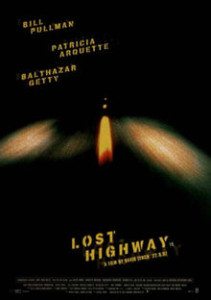 Lost Highway: After watching Mulholland Drive and listening to my brain rattle around my head like a loose marble for days, I figured I better have a squizz at Lost Highway. This David Lynch film is supposed to be even more obtuse and feverish and lots of people distinctly did not like it at all. Those sound like a couple of good reasons to watch it.
Lost Highway: After watching Mulholland Drive and listening to my brain rattle around my head like a loose marble for days, I figured I better have a squizz at Lost Highway. This David Lynch film is supposed to be even more obtuse and feverish and lots of people distinctly did not like it at all. Those sound like a couple of good reasons to watch it.
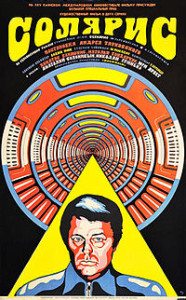 Solaris: I’ve seen the Steven Soderbergh remake of this Andrei Tarkovsky classic, which is itself a remake of a Russian television film based on Stanislav Lem’s novel of the same name. I’m not the hugest Tarkovsky fan, but the man does know how to burn down a building. This sort of science fiction is appealing to me and who doesn’t love a 165-minute Russian movie about astronauts having emotional crises? What? Well, I’m going to watch it anyway.
Solaris: I’ve seen the Steven Soderbergh remake of this Andrei Tarkovsky classic, which is itself a remake of a Russian television film based on Stanislav Lem’s novel of the same name. I’m not the hugest Tarkovsky fan, but the man does know how to burn down a building. This sort of science fiction is appealing to me and who doesn’t love a 165-minute Russian movie about astronauts having emotional crises? What? Well, I’m going to watch it anyway.
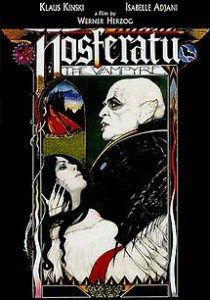 Nosteratu: Phantom Der Nacht: I cannot think of a single good reason why I have not watched Werner Herzog and Klaus Kinski’s take on the legend of the vampyre Nosferatu yet. It’s probably just like Twilight but with less pouting.
Nosteratu: Phantom Der Nacht: I cannot think of a single good reason why I have not watched Werner Herzog and Klaus Kinski’s take on the legend of the vampyre Nosferatu yet. It’s probably just like Twilight but with less pouting.
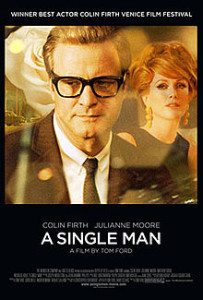 A Single Man: Will I ever watch this Tom Ford festival favorite, starring Colin Firth and Julianne Moore? Only if I don’t pay attention to my queue and it gets shipped to me before I put something else ahead of it. I’m sure it’s decent. I bet Colin Firth is great. I’m also reasonably sure it will not change my life in any way and it’s unlikely it will inspire me to write anything.
A Single Man: Will I ever watch this Tom Ford festival favorite, starring Colin Firth and Julianne Moore? Only if I don’t pay attention to my queue and it gets shipped to me before I put something else ahead of it. I’m sure it’s decent. I bet Colin Firth is great. I’m also reasonably sure it will not change my life in any way and it’s unlikely it will inspire me to write anything.
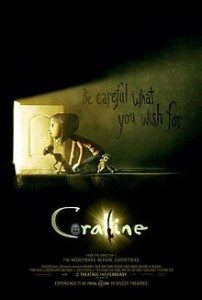 Coraline: It’s pretty amazing how quickly my queue goes from stuff I’m ashamed to have never seen to stuff I’m fairly sure I’ll never get around to watching. Coraline… I bet it’s fun and has a great production design. Sometimes I just want to watch something entertaining and this could fit the bill. Like last night, when I made the mistake of watching Dredd. Talk about a film that reviews itself.
Coraline: It’s pretty amazing how quickly my queue goes from stuff I’m ashamed to have never seen to stuff I’m fairly sure I’ll never get around to watching. Coraline… I bet it’s fun and has a great production design. Sometimes I just want to watch something entertaining and this could fit the bill. Like last night, when I made the mistake of watching Dredd. Talk about a film that reviews itself.
So. There you have it. Was this interesting? Should I do this again? Should I come back from my camping trip? Should I not be dead?
You tell me.

I loved A Single Man. It really stayed with me for awhile. It’s beautifully shot. That one might surprise you.
I am a Tarkovsky fan, but Solaris is sort of my least favorite. It’s a bit maddening. Well, that’s normal for Tarkovsky, but this one really does try your patience. Maybe you just have to be in the right mood.
Solaris is indeed a bit of a chore. But being in the right mood helps. It’s good in its way, it’s just not as good as it seems to think it is. Or something.
Lost Highway is worth checking out, but it’s no Mulholland Drive. There are some brilliantly creepy scenes in it.
I never saw A Single Man either. But if Sokolow is going to go around plugging it, I’ll add it to my queue.
Which is only about 200 movies long at present. Sigh.
Lost Highway. That one I’m kind of looking forward to. I think I’ll watch it with Blue Velvet, which is due for a re-screening.
Lost Highway is one of the only movies I saw twice in theaters (and during its initial release). But I was much younger then. Not sure how it stands up now. In my memory, it’s still pretty good.
Glad to hear it (about Single Man). I’ll look forward to its arrival. Solaris… yeah. I’ve just basically got to watch it even though I doubt I’ll enjoy it. Such is life.
Also of note, Nosferatu is playing at the Castro on Oct. 6,
I’m down for that.
Amour is very good, but you should really see the original Funny Games . . . and The Piano Teacher. And Benny’s Video. Perhaps in that order. Or maybe the piano one first.
Hey Jason. Glad to see you here again.
Funny Games is so not my thing. Intellectually, it sounds arch, but as an experience it sounds avoidable. I’ll check out those others depending on how I feel about Amour, which is on my coffee table right now insisting I screw up your order.
The original is phenomenal, left me scarred. I said I’d never recommend it to anyone. I plan on avoiding the remake forever. But you should see the original. It probably helped that I knew absolutely nothing going into it–except that it was by the guy who made The Piano Teacher.
Just to be clear, yes, I said I would never recommend Funny Games to anyone, and I am unreservedly recommending it to you. (I guess to both Evil Genius and Supreme Being.) The reason, I guess, is because I think it’s something that should be seen by anyone who takes film criticism seriously and who is able to withstand cinematic torment.
By the way, I’m pretty sure Funny Games and Benny’s Room both had a direct and strong influence on the Coen Bro’s No Country For Old Men. The parallels are strong and interesting.
I may as well throw my two cents in on the rest of the movies on your list:
Nosferatu is a definite must-see. One of Herzog’s best, and not as trying as Aguirre or Fitzcarraldo (though those are probably his best).
Ringu is definitely interesting and scary enough–especially if you haven’t see the remake. The Japanese sequels (well, sequel and prequel) are extremely bizarre, in so far as they seem to be working on the premise that horror movies do not need such things as plot or logic. But Ringu is good stuff.
I remember enjoying Solaris, but wondering why, for example, I had to watch a man being driven in a car and doing nothing, in silence, for five solid minutes. Thinking of it reminds me that I should watch more Tarkovsky, but I don’t know when I’ll have the patience for it again.
A Single Man was good. Solid. Interesting to look at. But not a must-see.
I haven’t seen the rest on the list.
Tarkovsy, in general, is too slow for me. Sometimes beautiful, but frustratingly unhurried.
Watched Onibaba last night. Will write something up about it today or tomorrow.
I’ve seen numerous Hanneke films (though not yet Amour), including both versions of Funny Games. The remake, though a shot for shot version, fails to take off at all. A strange and failed experiment, that.
As for the original, I think it is indeed worth seeing if one’s interested in looking at film at a deeper than surface level. The problem with the movie for me is that this is the only thing it has going for it, this intellectualized angle. As a movie, it’s only so-so. It suffers the same problem as, say, Natural Born Killers and Man Bites Dog: its purpose is to indict the audience for enjoying excessive film violence, but it does so by making a film whose only pleasures are excessive film violence. It’s all well and good to be impressed by Hanneke’s subtlety in making complicit the audience (unlike the hit-you-over-the-head methods used in those other two movies), but what you’re left with is still a simple home invasion flick. Its purpose is to exist only as an intellectual exercise. I liked how he did what he did. It’s even kind of brilliant in its way. It’s just…I need more from a movie, I guess. I need it to work on a level of story and drama. If everything is designed to appeal to the intellectual deconstructing of what’s happened, you get something that might be interesting after the fact, but while watching it, you end up feeling bored and manipulated. Or I did, anyway.
Cache is also an interesting one of his. The White Ribbon less so, though it got a lot of press at the time. I still haven’t seen The Piano Teacher.
It sounds like Funny Games would make a weird double bill with Lovelace, which is out now and which I saw an early (rough) screening of.
It’s a film in two parts, each covering the same period in Linda Lovelace’s life. In the first half, it shows you what the world saw — and it’s FULL OF SEX and Amanda Seyfried naked and gorgeous. Then, in the second half, it shows you what that period was like for Lovelace herself and it’s ghastly. But you’re left (or I was left) feeling like a monster for enjoying seeing Seyfried naked and enjoying watching sex. So I hated the movie. I felt like I’d been tricked into enjoying something and then told, in detail, why I was an asshole for enjoying it.
As if sex (unlike violence) is inherently wrong, a view I strongly disagree with. Or as if pornography is inherently abusive, which is a lot trickier to assume.
I suppose if you knew Lovelace’s story going in, it might come off differently. But I didn’t, and so I felt manipulated and scolded.
I understand some of your complain, Supreme Being. I didn’t feel indicted when I watched Funny Games. I don’t see the film working that way, though I know that’s what Haneke intended. For me, it works as a brilliant exercise in the manipulation of audience expectations. And it contains one of the most chilling depictions of pure evil I’ve ever seen. The cherry on top, for me, were the performances. That’s the main reason I don’t want to see the remake: I don’t want other actors (especially known faces) to interfere with my memory of those performances.
But what I disagree with in your complaint is the claim that Haneke used excessive violence. In fact, there’s no real violence on screen at all. All of the real violence is unseen–though you see its effects, except never in a very clear way. (That is one of the things that the Coen bro’s got from Funny Games, I think. Though there’s no real on-screen violence in Benny’s Video, either; and that one has the cattle gun, which I assume inspired the use of a cattle gun in the Coen Bro’s film.)
I misspoke. Or miswrote. There is no excessive violence. What Haneke did was make what I found to be a fairly typical movie about two affectless psychos who abuse a family. Typical, aside from the tiny ways he winks at the audience. Which, though small and few, are very obvious, puposefully so. He’s forcing you to acknowledge that you’re getting off on the abuse of the family, that you are, essentially, on the side of the psychos, in the sense that they’re driving the entertainment. They’re the ones who make the movie. The family is just some boring family.
I don’t really see that it manipulated my expectations in any way. The story goes along as expected. What it manipulates is how the audience feels about what they’re watching. You see the events differently when forced to accept why the film is entertaining. It’s entertaining to watch horrible people do horrible things to other people.
I don’t really see this as a ground-breaking statement in the end.
By the way, I agree about Cache and The White Ribbon. I also saw Code Unknown, which was not memorable (and impossible to decipher).
I never saw the films as making an intellectual statement. And I went into it knowing absolutely nothing, which I’m assuming was not the case with you. I can’t write more without a major SPOILER ALERT.
I was always on the side of the family, not the abusers. And as the movie started and began to unfold, I thought it was going to be about them figuring out how to get out of this difficult situation. I had no idea that none of them would survive it. So this is how it manipulated my expectations: It kept showing me different ways out for them, and then taking them back. It kept teasing me into thinking something good would happen, only to turn around and make everything worse. It was incredibly painful for me to watch. That’s why I said I’d never recommend it to anyone.
It is a very manipulative movie–but all movies are manipulative. This one is so in very in-your-face ways. That’s part of what is so brilliant about it, in my opinion. Not that Haneke was able to manipulate me, but that he was able to do it in such an asshole way and still make me feel for the characters–and still let me suspend my disbelief.